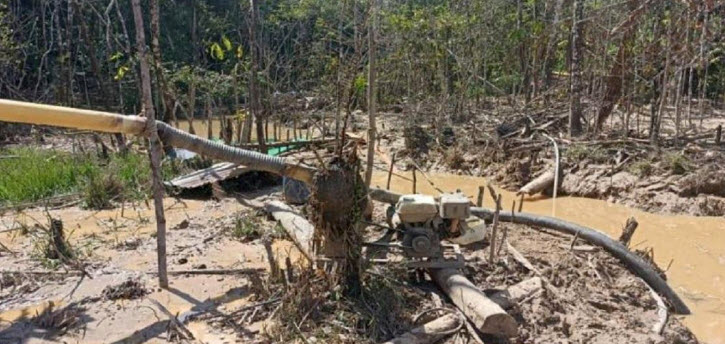According to satellite imagery, over 750 hectares of Yacapana National Park in the Venezuelan Amazon were deforested between 2021 and 2022 – all for illegal gold mining.
This is according to data from the Monitoring of the Andean Amazon Project (MAAP) of the US-based non-governmental organization (NGO) Amazon Conservation, presented on January 9.
“The regime can hardly claim that it does not realize that so many hectares have been destroyed and this is not happening,” said Emiliano Terán, a researcher at the Center for Development Studies at the Central University of Venezuela.

“This worrying pattern goes hand in hand with strengthening the illegal economy.”
Due to the increased presence of armed groups trading weapons, ammunition, food, fuel, and drugs in the area, as well as human trafficking, all kinds of illegal activities are taking place in the national park, the Venezuelan nongovernmental organization Control Ciudadano said in a Jan. 11 report.
“Meanwhile, the regime and its armed forces remain silent,” the report said.
Nicolás Maduro’s regime has profited from illegal mining, receiving kickbacks and other illicit profits that provide Maduro with a livelihood.
Internationally, Maduro’s gold mining operations have allowed the regime to form alliances with other corrupt governments to evade international sanctions jointly, Washington-based think tank Freedom House said in a late 2020 report.
MAAP’s estimates showed a cumulative deforestation of 1,537 hectares within the Yacapana mountain sector, of which nearly half (49%) occurred in the last two years.
“Of the total cumulative deforestation, 17 hectares occurred on the summit of the ‘sacred Tepuy’ [Table Mountain].”
The National Liberation Army (ELN), dissident members of the Revolutionary Armed Forces of Colombia (FARC), and the Bolivarian National Guard (GNB) have been mining gold in the national park, according to a Colombian Army report accessed by the environmental news site Mongabay.
According to the report, members of the GNB go there weekly to collect bribes in the form of gold and money.
With these transactions, the exploitation of the metal continues smoothly, Mongabay reports.
According to the Venezuelan organization SOS Orinoco, the size of the illegal mining operations is comparable to 1,884 soccer fields.
By analyzing high-resolution satellite imagery, SOS Orinoco and Amazon Conservation were able to identify 8,000 mining camps or machines in the lowlands of the national park and 425 more camps or machines in the upper part of the mountains.
IMPACT
According to the Observatory of Political Ecology of Venezuela, the environmental, social, and cultural impacts of gold mining in Venezuela are complex and wide-ranging.
Illegal mining in Venezuela is an example of “predatory extractivist,” according to the organization.
Some consequences of increasing illegal gold mining include the displacement of indigenous peoples, murders and disappearances, cases of modern-day slavery, destruction of ecosystems, contamination of rivers with mercury, and dynamics of dispossession and territorial fragmentation, the Observatory said.
“It also affects the traditional ways of life of indigenous peoples. An example is the creation of organized indigenous guardians who protect their territories with their own resources,” Terán said.
“Because of their structure, the guardians get involved in violent situations because the criminal groups don’t like it.”
The main factors that provide fertile ground for the worsening of illegal gold mining are the price of gold, the exodus of criminal groups, corruption, the collapse of oil revenues, and their impact on indigenous communities.
“In Venezuela, corruption has increased not only qualitatively but also quantitatively. A completely unchecked corruption that creates new fiefdoms of [gold] extraction,” Terán said.
“Yacapana is essentially what is happening throughout the Venezuelan Amazon.”
DIALOGUE
“To arrive at radical solutions, we must not look for ecological ideals but for survival itself,” Terán continued.
“We must lift this regime, in which there is no democratic framework, and try to move to a government in which there is a dialogue with society and certain guidelines for the continuation of life in the country and on the planet can be respected.”
“In the Venezuelan Amazon, it is necessary that international institutions understand the importance of precautionary measures and the protection of indigenous communities since they are very much at risk and that citizens are informed and educated about illegal gold mining and the problems of climate change,” Terán concluded.

